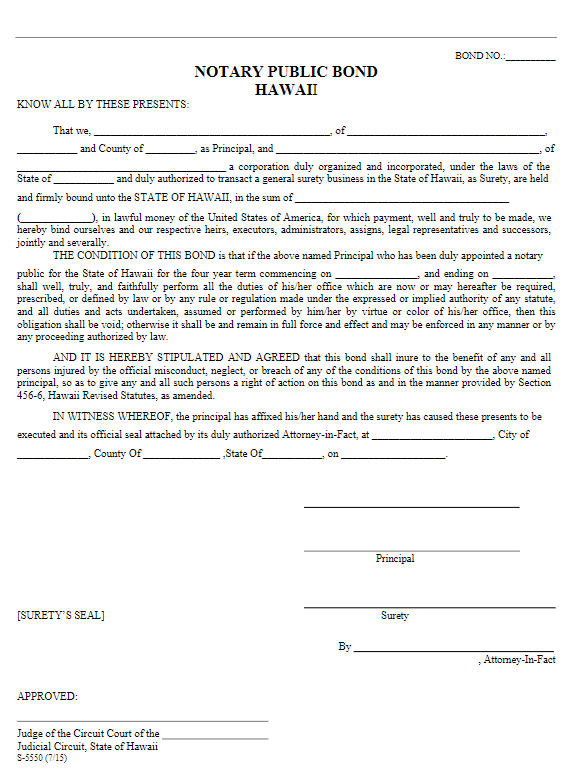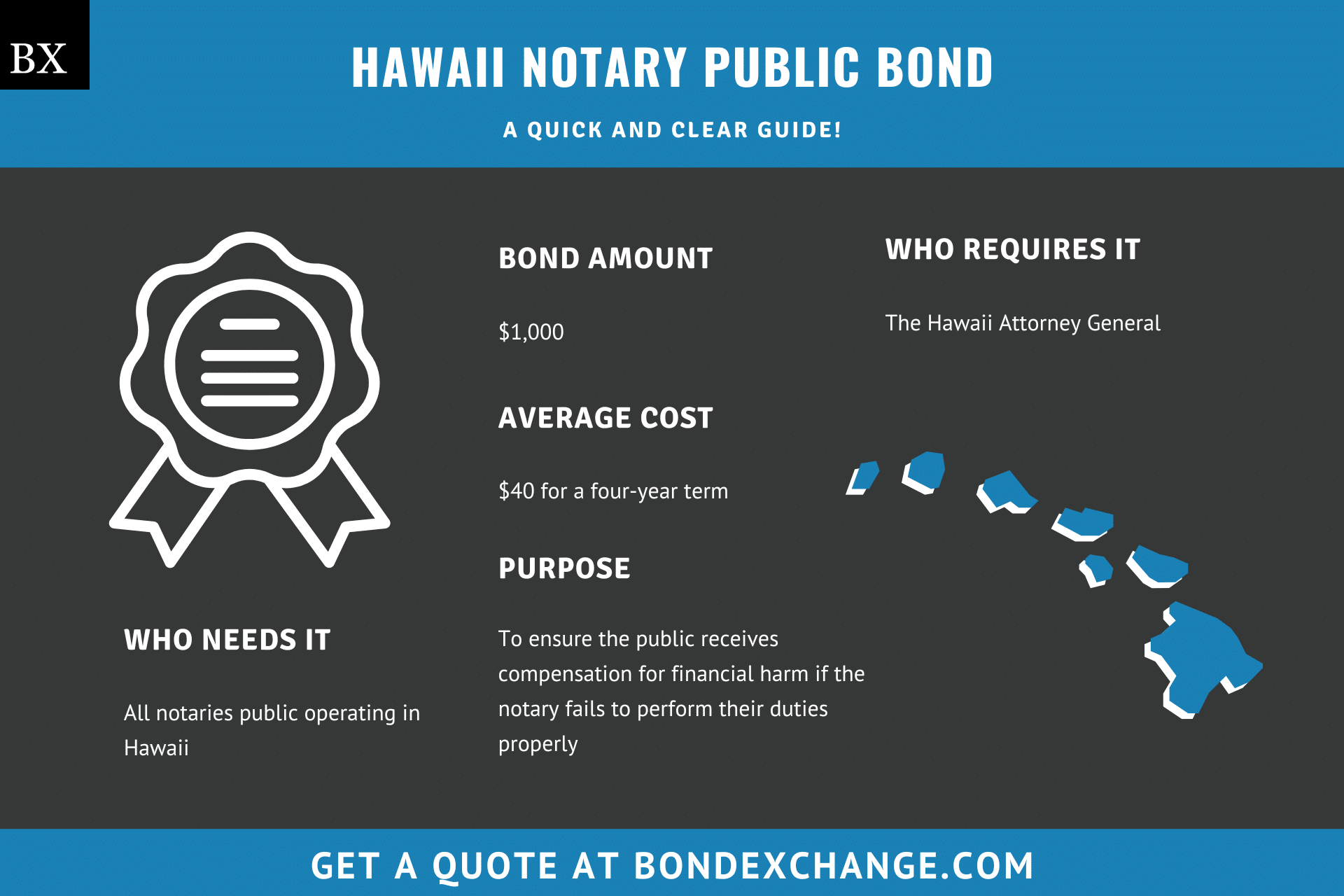Hawaii Notary Public Bond: A Comprehensive Guide
This guide provides information for insurance agents to help their customers obtain a Hawaii Notary Public bond.
At a Glance:
- Average Cost: $40 for a four-year term
- Bond Amount: $1,000
- Who Needs it: All notaries public operating in Hawaii
- Purpose: To ensure the public receives compensation for financial harm if the notary fails to properly perform their duties
- Who Regulates Notaries Public in Hawaii: The Hawaii Attorney General

Background
Hawaii Statute 456-1 requires all notaries public operating in the state to obtain a commission from the Secretary of State before performing notarial acts. The Hawaii legislature enacted this requirement to ensure that notaries engage in ethical business practices. To provide financial security for the enforcement of the commission requirement, notaries must purchase and maintain a $1,000 surety bond to be eligible for a commission.
What is the Purpose of the Hawaii Notary Public Bond?
Hawaii requires notaries to purchase a surety bond as a prerequisite to obtaining a notary commission. The bond protects the public from financial harm if the notary fails to comply with the regulations outlined in Hawaii Statute 465-5. Specifically, the bond protects the public if the notary signs any documents for persons committing fraud, does not actually witness the signatures on documents being notarized, or fails to maintain an accurate record of all notarial acts. In short, the bond is a type of insurance that protects the public if the notary violates the terms of their commission.
How Can an Insurance Agent Obtain a Hawaii Notary Public Surety Bond?
BondExchange makes obtaining a Hawaii Notary Public bond easy. Simply log in to your account and use our keyword search to find the “Notary” bond in our database. Don’t have a login? Gain access now and let us help you satisfy your customers’ needs. Our friendly underwriting staff is available by phone at (800) 438-1162, email, or chat from 7:30 AM to 7:00 PM EST to assist you.
At BondExchange, our 40 years of experience, leading technology, and access to markets ensures that we have the knowledge and resources to provide your clients with fast and friendly service whether obtaining quotes or issuing bonds.
Not an agent? Then let us pair you with one!
Click the above image to find a BX Agent near you
Is a Credit Check Required for the Hawaii Notary Public Bond?
No, a credit check is not required for the Hawaii Notary Public bond. Because the bond is considered relatively low risk, the same low rate is offered to all notaries in the state regardless of their credit history.
How Much Does the Hawaii Notary Public Bond Cost?
The Hawaii Notary Public bond costs just $40 for a four-year term.
Who is Required to Purchase the Hawaii Notary Bond?
Hawaii requires notaries public to purchase a surety bond as a prerequisite to obtaining a notary commission. To paraphrase Hawaii Statute 456-1.6, a notary public is an individual commissioned by the attorney general to perform the following duties:
- Administer oaths
- Witness the signing of documents
- Attest to the identity of signers
- Note protests
- Take acknowledgments of documents.
A notary public commissioned for government services will not be required to pay any fees or purchase a surety bond.

BondExchange now offers monthly pay-as-you-go subscriptions for surety bonds. Your customers are able to purchase their bonds on a monthly basis and cancel them anytime. Learn more here.
How Do Notaries Apply for a Commission in Hawaii?
Notaries public in Hawaii must navigate several steps to obtain a commission. Below are the general guidelines, but applicants should refer to the attorney general’s website and the state’s Notary Public Manual for details on the process.
Notaries have the option to apply to be a traditional notary solely doing in-person notarizations or a remote online notary providing both in-person and online notarizations.
Commission Term: All Hawaii Notary Public Commissions are valid for four years from the date of issuance and must be renewed before the expiration date.
Step 1 – Meet the Qualifications
To be eligible to apply for a notary public commission, applicants must meet all of the following criteria:
-
- Be at least 18 years old
- Be a Hawaii resident
- Be a United States citizen or national/permanent resident alien seeking U.S. citizenship
Step 2 – Complete the Application
Notaries public must submit a completed application, including a $20 application fee, online here. Applicants will need to set up an eHawaii.gov account prior to beginning the application.
Step 3 – Take the Exam
Notaries are required to pass a written examination on the laws and rules regulating notaries public. After their application is approved, notaries will receive instructions on how to schedule the exam and pay the $10 examination fee. Notaries must receive a minimum score of 80% to pass the exam.
Step 4 – Pay for a Commission
After passing the exam, notaries public must purchase a commission online in their eHawaii.gov account portal. The commission costs $100 and, once the commission is paid for, notaries will receive final instructions on how to purchase a surety bond and file their commission.
Step 5 – Purchase a Surety Bond
Notaries Public must purchase and maintain a $1,000 surety bond.
How do Hawaii Notaries Renew Their Commissions?
Notaries will receive a renewal notice by email 60 days prior to their commission expiration date with instructions on how to renew online. All renewal applications and steps can be found in the eHawaii portal. All Hawaii Notary Public Commissions are valid for four years from the date of issuance and must be renewed before the expiration date.
What are the Insurance Requirements for Hawaii Notaries?
Hawaii does not require notaries to purchase any form of liability insurance as a prerequisite to obtaining a business commission. Notaries public must purchase and maintain a $1,000 surety bond.
How Do Hawaii Notaries File Their Bonds?
Notaries public should submit their completed bond forms, including the power of attorney, to the circuit court clerk’s office in the judicial circuit where the notary resides.
The bond requires signatures from both the surety company that issues the bond and the notary. The surety company should include the following information on the bond form:
- Legal name, address, and county of residence of the entity/individual(s) buying the bond
- Surety company’s name and state of incorporation
- Bond amount
- Start and end dates of notary’s commission
- Date the bond is signed
What Can Hawaii Notaries Do to Avoid Claims Against Their Bonds?
To avoid claims on their bonds, notaries public in Hawaii must follow all commission regulations in the state, including some of the most important issues below that tend to cause claims:
- Do not leave any notary supplies (seal and journal) in a place where they can be easily stolen
- Do not perform notary services for entities/individuals who are engaged in acts of fraud
- Ensure that the signers of documents are who they say they are and are not misrepresenting themselves
- Witness the signatures of all documents being notarized
- Record all transactions in a notary journal
What Other Insurance Products Can Agents Offer Notaries in Hawaii?
Hawaii does not require notaries to obtain any form of liability insurance. However, many notaries will consider obtaining errors and omission (E&O) insurance. Bonds are our only business at BondExchange, so we do not issue liability insurance, but our agents often utilize brokers for this specific line of business. A list of brokers in this space can be found here.
How Can Insurance Agents Prospect for Hawaii Notary Customers?
Hawaii conveniently provides a public database of commissioned notaries operating in the state. Contact BondExchange for additional marketing resources. Agents can also leverage our print-mail relationships for discounted mailing services.
What Other States Require Notary Bonds?
29 states and the District of Columbia require notaries to obtain a Notary Bond as a prerequisite to obtaining a commission. Insurance agents should utilize our Main Notary Bond Page for a detailed analysis of the Notary Bond requirements nationwide.

